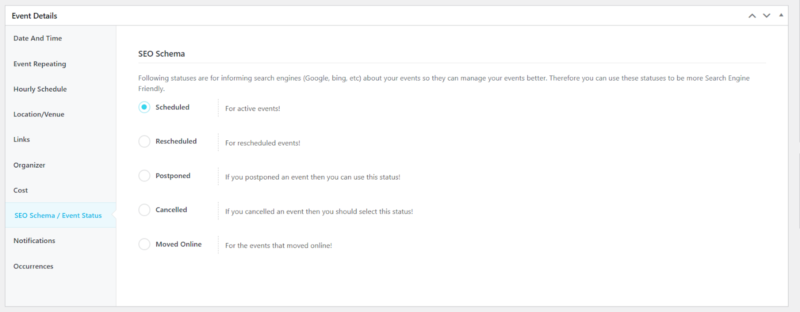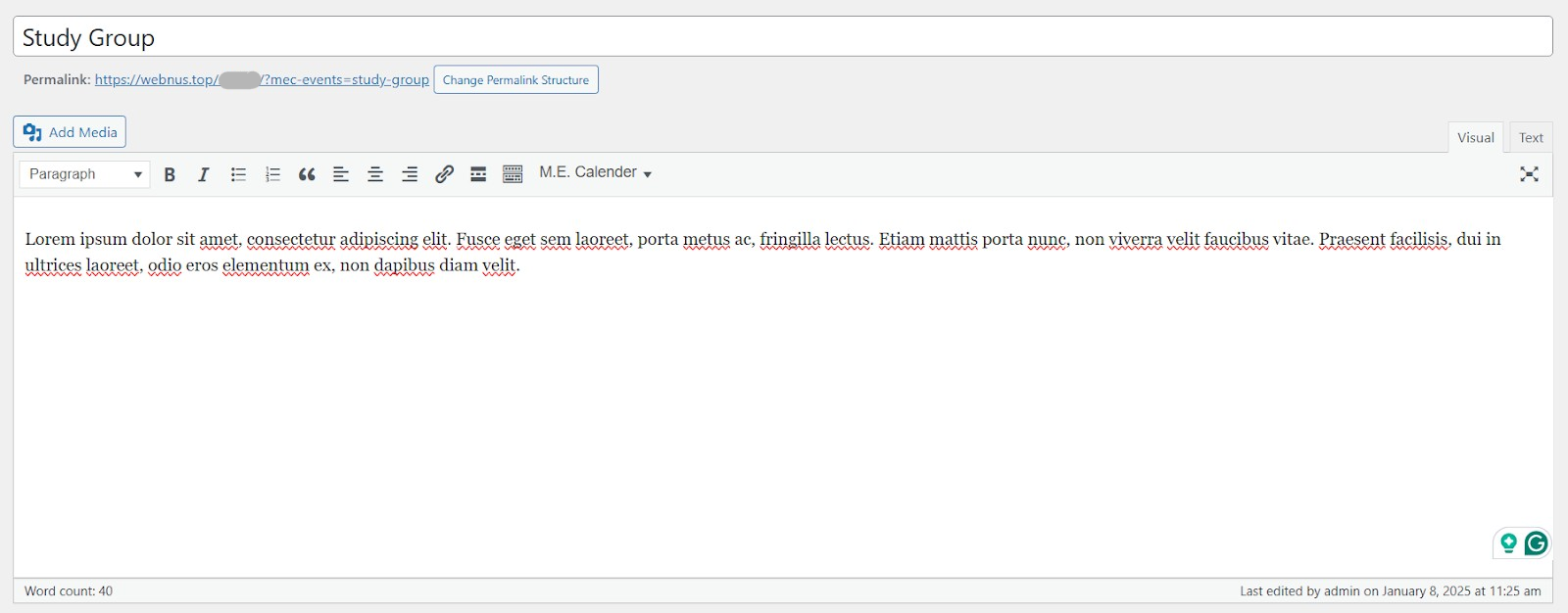
Boost Event Visibility with MEC’s Top SEO Features in 2025
Running an event website? You already know how important it is to get your events in front of the right audience. But with so much competition online, how do you make sure your events stand out?
Using a powerful WordPress events calendar can make all the difference in event visibility and management. Learn how to boost your event business with the right tools.
This is where the SEO features in Modern Events Calendar can help you to stand taller than the rest.
In this article we’ll see what built-in SEO features Modern Events Calendar has and how they can boost event visibility, attendee attraction, and search engine results optimization – without an extra plugin.
Why SEO Matters for Event Websites
As an event organizer, you’d want more people to find your events online. There are a variety of ways to ensure that, one of the most important ones is leveraging SEO (Search Engine Optimization).

Essentially, SEO helps your event pages attain a higher rank on Google or other search engines and this, potentially, increases your attendees.
Organizer’s Secret: Increasing your event's visibility is crucial, but ensuring attendance is just as important. Check out these proven tips to increase event attendance effortlessly.
However, there is a small pickle: event-related searches are very competitive, no matter if it’s a local workshop or an international conference.
MEC offers you the necessary tools to manage your events and to optimize your visibility with its built-in SEO features. MEC’s SEO features are intended to optimize your event pages and improve visibility without getting too complicated.
MEC stands out among event plugins, but how does it compare? Explore the best WordPress events calendar plugins available this year.
Let’s dive in and discover what SEO features are baked in Modern Events Calendar.
Schema Markup for Events: Get Featured in Google Results
Those events you see in Google search with their fancy details such as date, time, and location, ever wondered why they show up like that?
That’s thanks to Event Schema: a type of structured data that talks to the search engine to share the specific details of the event.
Pro-Level Strategy: Want to track your event’s success more effectively? Learn how to measure your event’s ROI using key performance indicators.
Why does this matter?
Event Schema helps your events appear in informative and rich snippets on Google. This way, the event becomes more eye-catching and users are more likely to click on it.
How MEC helps
MEC automatically adds Event Schema to your events. You don’t need to do any coding or install any other plugin.
Just enable the feature and MEC will do its magic to make your events stand out in search results.
SEO-Friendly Event URLs: Improve Click-Through Rates
Let’s talk about URLs. A messy, hard-to-read URL like /event/12345 doesn’t exactly scream “click me!”
On the other hand, a clean, descriptive URL like /webinar-digital-marketing-2025 is not only easier to read but also better for SEO.
A well-structured event URL is just one step in building a strong event site. If you're starting fresh, check out our guide on creating an event website with WordPress in just eight simple steps.
Why URLs matter?
Search engines (and humans!) prefer URLs that are clear and include relevant keywords. They improve click-through rates and help your pages rank higher.
How MEC handles it
MEC lets you customize your event URLs with dynamic slugs. You can include keywords like your event name, date, or location to make them more search-friendly.
MEC is one of the top solutions, but there are several great tools available. Compare the top event management software to find the best fit for your needs.
Keyword Optimization: Title and Descriptions
When someone searches for an event, the first thing they see is the title and description. These are your chance to grab their attention and convince them to click.
Why this matters?
Optimizing your title and descriptions with relevant keywords helps your events rank higher and makes them more appealing to users.
How MEC helps
MEC allows you to edit the event title and description on the event page itself, without needing to go to other menus or using other plugins.
Pro Tip: Make sure to edit the Title Tag and Meta Description for your event pages, using your favorite SEO plugin, to significantly boost SEO visibility.
Image Optimization: Fast Loading and Alt Tags
Images are a huge part of event promotion, but if they’re not optimized, they can slow down your site and hurt your SEO.
Advanced Tip: Optimizing images is important for event visibility, but don’t forget about on-site experience. Use tools like the MEC Ticket Scanner app to streamline check-ins effortlessly.
Why image SEO matters?
Search engines consider factors like image load time and alt tags when ranking your pages. Plus, descriptive alt text helps your images show up in image searches.
How MEC helps
MEC allows you to add alt tags to your event images and ensures they’re optimized for fast loading.
Pro tip: Use alt text that includes your event keywords for an extra SEO boost.
Bonus: XML Sitemaps and Integration with SEO Plugins
If you’re serious about SEO, you’ve probably heard of XML sitemaps. These files help search engines crawl and index your website more efficiently.
Quick Tip: For an even more comprehensive approach, MEC also supports seamless integrations with email marketing tools. Learn about the best email integrations for Modern Events Calendar to enhance communication with your attendees.
Why sitemaps matter?
They ensure your event pages are discovered and ranked by search engines.
How MEC helps
MEC integrates seamlessly with popular SEO plugins like Yoast SEO and Rank Math. This means your events are automatically included in your site’s sitemap, making it easier for search engines to find them.
Practical Tips to Maximize SEO with MEC
Ready to take your event SEO to the next level?
Here are some quick tips to make the most of MEC’s features:
SEO helps bring attendees to your event, but what happens after? Implementing smart strategies to engage attendees after your event ensures they return for future gatherings.
Conclusion: Optimize Your Events with MEC’s Built-In SEO Features
In 2025, event visibility is more important than ever—and Modern Events Calendar is here to help. With features like Event Schema, SEO-friendly URLs, keyword optimization, and image optimization, MEC makes boosting your event website’s SEO easy without the hassle of extra plugins.
So why wait? Start using MEC today and watch your events climb to the top of search results. Your attendees are out there—make sure they can find you!
Bonus Guide: Once your event is over, don’t forget the importance of post-event analysis. Check out our guide on creating the best post-event report to measure success and improve future events.
Recommended Posts

How to Create an Effective Event Marketing Plan from Scratch in 2025
December 22, 2025




